Creative approaches to teaching and learning are increasingly being used throughout higher education and beyond. One of the trend setters in what is known as table-top game design is the research unit for Technology Enhanced Learning and Innovative Education and Training in South Africa (TELIT-SA), located at the North-West University (NWU).
The unit’s Veruschka Pelser-Carstens and Lance Bunt are masters at game design. Their latest game, Liike, is a board game for accounting students that aims to address gaps between university and the world of work. Several modules within the BCom programme form part of the game, including law, tax, accounting and financial management.
Veruschka explains that feedback from professional bodies and the industry indicates that employers expect students to be able to apply theoretical knowledge. The board game allows the creators to test technical know-how and manage industry requirements and expectations – and it’s anything but dull for the players.
Educational and entertaining
“The human brain thrives on curiosity,” says Veruschka, explaining that research on inquisitive learning reveals that using board games in an education setting promotes the process of brain development.
The reason for this is simple: curiosity makes learning more effective and enjoyable because the players are constantly looking for answers to questions. In the case of Liike, the game was designed to be an educational experience first and entertaining second.
The game has research value too. It is the first physical, multiplayer board game created for interdisciplinary outcomes in South Africa.
Gameplay and digital learning
Liike is set in a fictional business world that the players (students) must conjure up themselves. The players take control of miniatures that they move around the board, planning their own career path while accumulating points and money by answering game cards. They choose from one of six possible player characters.
These characters are a lawyer, an auditor, a tax consultant, an accountant, a financial manager and a corruptor – aptly referred to as “the Wolf of Paw Street”. During the game, the backstories of each character are communicated to players through the use of “blipps”. Lance says the Blippar-app used to generate these blipps works by turning mobile phones into augmented reality devices, changing gameplay into an interactive wow experience.
Another digital element is the use of Quick Response Codes (QRCs) to access metadata on external domains such as the NWU e-learning platform, eFundi.
During the game, players have the opportunity to apply technical skills and knowledge and obtain so-called pervasive skills (needed to interact effectively with other people). Gameplay then sees students put through their paces in terms of ethical behaviour and professionalism, personal attributes and professional skills, all of which eventually leads to a better understanding of how to fill the gap between the classroom and the boardroom.
The team behind the game
Veruschka and Lance may be the lead developers, but Liike represents a collaborative research endeavour under study leaders Prof Seugnet Blignaut, a South African expert on computer-assisted education, and Dr Carolina Islas Sedano, a world-renowned gaming expert from the University of Eastern Finland.
Other collaborators include Marie Preston, Monique du Plessis, Estie Lubbe, Dr Thys Swanepoel and Japie Greeff, all members of the NWU’s School of Accounting Sciences and the School of Computer Sciences.
The road ahead
According to the developers, a paper version of the game is currently available for play testing and the next step will see the game graphics being re-designed for 3D printing. As the study continues, the game will be made available to more lecturers to use in the classroom setting.
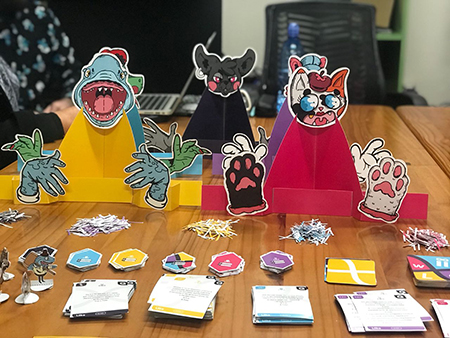
The paper version of the table-top board game, Liike.
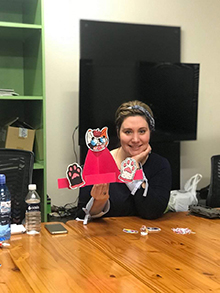
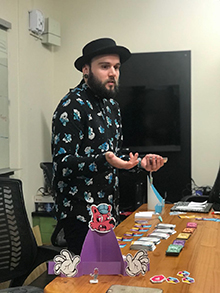
Game developers, Veruschka Pelser-Carstens and Lance Bunt.
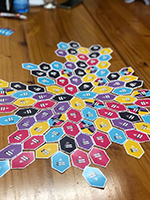
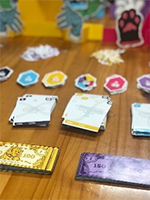
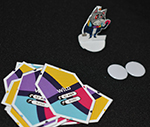
Some of the game elements.
